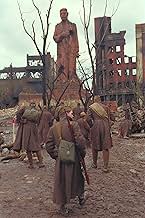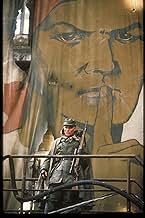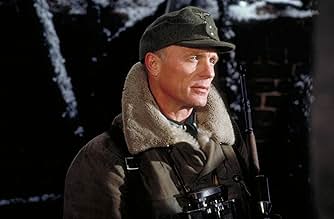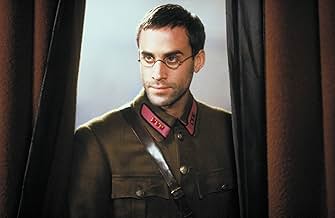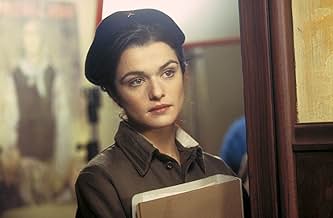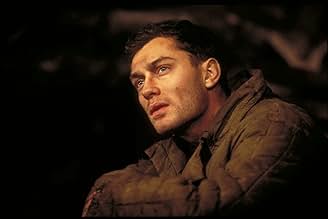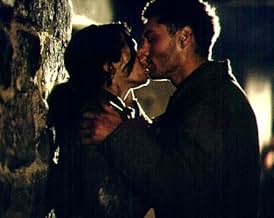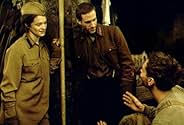Deux snipers, l'un russe, l'autre allemand, jouent au chat et à la souris pendant la Bataille de Stalingrad.Deux snipers, l'un russe, l'autre allemand, jouent au chat et à la souris pendant la Bataille de Stalingrad.Deux snipers, l'un russe, l'autre allemand, jouent au chat et à la souris pendant la Bataille de Stalingrad.
- Réalisation
- Scénario
- Casting principal
- Récompenses
- 7 nominations au total
- Sacha Filipov
- (as Gabriel Marshall-Thomson)
- Red Army General
- (as Hans Martin Stier)
- German NCO
- (as Clemans Schick)
Avis à la une
But other than the clarification I needed between the Battle of Leningrad and the Siege of Stalingrad which I always mix up (whoops, I think I just did it again), and Hitler's and Stalin's fallacies as military leaders in relation to the symbolic importance of the Volga (and the movie could have used more strategic explanations), he and I pretty much agreed about the movie.
There's a taut, gritty war movie screaming to come out of a drekky melodrama. The best parts are the battles, of troops and individuals. The opening sequence of soldiers thrown from trains to boats to the front line is terrific and frightening.
The one-on-one between Ed Harris's Nazi sharpshooter and Jude Law's hunter (though he doesn't do working class too convincingly) is exciting.
The most captivating surprising is Bob Hoskins as Krushchev. He completely inhabits the character and brings him completely to blood and guts life - showing just what it takes to survive as a top man to Stalin.
There was also more potential in Joseph Fiennes' political officer as insight into propaganda that is only occasionally effective (after all, "Ryan" was similarly about a PR stunt).
I thankfully dozed off during most of the ridiculous sub-plot of the love triangle. There appears to be only a couple of women living in this city, and they sure do get in the way, as these few can themselves provide multi-lingual translations, sex, food, lousy child care and brave sharpshooting.
The music by James Horner is atrociously bombastic, wincibly so.
(originally written 3/31/2001)
"Enemy At The Gates" may be one of the best war films I have seen since "Saving Private Ryan" because it is executed perfectly. With incredible performances, script and the impact I felt; "Enemy At The Gates" sets the tone as the first great war film of the 22nd century. This film can be served as the appetizer to the main course coming out soon, "Pearl Harbor."
Jude Law, Joseph Feinnes, Rachel Weisz, Ed Harris and Bob Hoskins come together to re-visit the Battle of Stalingrad in 1942. The best thing about seeing each one of the actors perform was they all gave 100 percent effort to make the film as real as possible; they did an excellent job. Fiennes, Weisz and Hoskins were the icing to a cake that was delicious from the start.
The highlights of "Enemy At The Gates" always came when Law and Harris were on screen because they played excellent psychological mind games with one another to win; furthermore, it was like watching master chess players playing for the grand prize. It was also enjoyable to see the strategies and tactics each would use to out-maneuver the other.
"Enemy At The Gates" drew me with its many action sequences similar to those in "Saving Priate Ryan." Also, the love triangle between the three main leads was interesting to watch and see how it would unfold. I felt like I was in the movie because the writer did an excellent job at making me feel exactly what they felt and experience what they were going through.
There is no rule that states dialogue is needed for a successful film. While "Enemy At The Gates" has dialogue, the scenes that have none stand out in my mind the most because we see close-ups of both snipers and the expressions on their faces. This is incredible to me because the intensity shown on their faces speaks volumes about what the movie is really about.
This may not be the best war film ever made but with two of the brightest young stars on the rise, an actress that is here to stay and a veteran that continues to turn in knock-out performances, "Enemy At The Gates" will be remembered for a long time.
Now I'm prepared to believe that snipers played a valuable role in this kind of warfare - I wouldn't know - but Vassili's primary value, we must assume in the absence of information to the contrary, is as propaganda - a means of keeping up the morale of the local troops. But there's something circular here. The snipers are the only people we see doing any actual fighting, and by the end of the film they seem to be devoting all their efforts to shooting a German sniper who is in turn doing nothing but trying to shoot Vassili. What does ANY of this have to do with, you know, the invasion?
The fact that the troops of a hostile foreign power are on Russian soil (they haven't yet been defeated, and it looks to be only a matter of time before even Moscow would be overrun) doesn't seem to motivate the characters to do much. Nobody makes a single decision for the good of the war effort as a whole. Danilov builds up the Vassili legend because of personal feelings and is ready to tear it down later for other personal reasons; Tania wants to kill Germans - kill them herself, by hand, rather than help her fellow soldiers as best she can by working in intelligence - because they killed her parents; Danilov tries to transfer her to a safer job not because that's where she should be (it's a mere coincidence that that IS where she should be), but because he's hitting on to her; Vassili's heart isn't in the duel with the German sniper until he has a casual acquaintance's death to avenge. When Sacha's mother is told that her son is a traitor (now serving the forces who have bombed the city she grew up in to rubble), her only reaction is, "Perhaps he'll be safer with them than with us." Wherever we look, we see dreary personal concerns. Did any of these people notice that the enemy IS at the gates?
If Anaud was trying to make his characters more plausible by making them pettier, he failed. When Sacha tells a third party what we supposedly already know - that Tania is in love with Vassili - it came as news to me. I hadn't seen any insipient love anywhere. I suppose I ought to have worked it out, by assuming that the single female character must be there to fall in love with someone and using a process of elimination to work out who it was (she plainly didn't care for one of the two candidates, therefore she must be head over heels with the other one), but really, even in a movie as dull as this, I have better things to do.
The opening is an amazing opera of mass destruction. Then it's a matter of a chess game. It's a fascinating cat and mouse game in the ruins of the city. I'm glad that nobody decided to talk in a fake Russian accent. That would be too distracting. This is a rare good American war movie not about Americans.
Le saviez-vous
- GaffesIn the scene where Vassili is lighting the cigarette butt he picked up from the German sniper, it's apparent by the flame he uses a butane lighter. Butane lighters were not invented until the 1950's.
- Citations
Commisar Danilov: I've been such a fool, Vassili. Man will always be a man. There is no new man. We tried so hard to create a society that was equal, where there'd be nothing to envy your neighbour. But there's always something to envy. A smile, a friendship, something you don't have and want to appropriate. In this world, even a Soviet one, there will always be rich and poor. Rich in gifts, poor in gifts. Rich in love, poor in love.
- Crédits fousThe end credits are slanted and curved.
- Bandes originalesLa Chanson des Artilleurs
Music by Tikhon Khrennikov
Lyrics by Viktor Gusev
(C) Musikvertag Hans Sikorski, Hamburg
Performed by The Red Army Choir (as Les Choers De L'Armee Rouge)
Courtesy of 7 Productions, Paris
Meilleurs choix
- How long is Enemy at the Gates?Alimenté par Alexa
- Is this film historically accurate?
- We are used to seeing long distance shootings in films about snipers, and Enemy At The Gates is no exception. But Stalingrad was a dense ruin. How did sniper battles really work there?
- What is the significance of the two crosses/ribbons Ed Harris' character changes nearing the end of the film?
Détails
- Date de sortie
- Pays d’origine
- Sites officiels
- Langues
- Aussi connu sous le nom de
- Stalingrad - Enemy at the Gates
- Lieux de tournage
- Sociétés de production
- Voir plus de crédits d'entreprise sur IMDbPro
Box-office
- Budget
- 68 000 000 $US (estimé)
- Montant brut aux États-Unis et au Canada
- 51 401 758 $US
- Week-end de sortie aux États-Unis et au Canada
- 13 810 266 $US
- 18 mars 2001
- Montant brut mondial
- 96 976 270 $US
- Durée2 heures 11 minutes
- Couleur
- Mixage
- Rapport de forme
- 2.35 : 1


